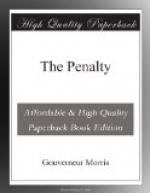“I got your telegram,” said Barbara.
“When?” he asked anxiously.
She broke into a sudden smile. “Oh,” she said, “about fourteen hundred years ago.”
“Barbara,” he said, “that’s a miracle! If you’d said thirteen hundred or fifteen hundred it would have been guessing, but fourteen hundred is the exact time that has passed since I telegraphed.”
“Have you had breakfast?”
“No,” he said, “I didn’t have time.”
They strolled through the familiar house, talking nonsense. They were almost too glad to see each other, for there was now no longer any question of Barbara making up her mind. It had been made up for her, and Wilmot knew this somehow without being told. But when had the definite change come?—that change which made her caring for Wilmot different from all her other carings? She could not say.
He had dreaded telling her about Harry West’s death. And when he had done so he watched her grave face with appealing eyes. Presently she smiled a little.
“I’m not heartless,” she said, “but I’m going to keep on forgetting all the times when there was anybody but you. I expect most girls do a lot of shilly-shallying before they are sure of themselves.”
“And you are really sure of yourself?”
“Yes, Wilmot, if I’m sure of you.”
“The first thing,” he said, “is to look into these mining properties we’ve fallen heir to. West wasn’t the kind of man to be easily fooled; at the same time I myself have learned something about mines.”
“For instance?” Her face was very mischievous.
“Well,” he said, “for instance, I have learned that there are mines and mines. And you know, Barbs dear, I’m not eligible yet. I owe money, I haven’t made good at anything, and I’ve got to—first of all. Haven’t I?”
“Are you going to sit right there and tell me that we’re not to be married until you’ve paid your debts and made a fortune? Where do I come in? What life have I to lead except yours? If you are in debt, so am I. If you’ve got to dig holes in the ground, so have I. Whatever has got to be done, we’ve got to do it together. So much is clear. Of course it would be easier for you!”
A little later he asked her what she was going to do with her head of Blizzard.
“Nothing,” she said. “If it is good enough, it will survive these troubled times. If it isn’t, somebody will break it up.”
“Are you through with art?”
“What have I to do with art?” she said. “I’m in love. I used to think that women ought to have professions and all. But there’s only one thing that a woman can do supremely well—and that’s to make a home for a man. That will take all that she has in her of art and heart and ambition and delicacy. Of course if a girl is denied the opportunity of making a home, she can paint and sculp and thump the piano and get her name in the papers. What I want to know is—when do we start West?”




